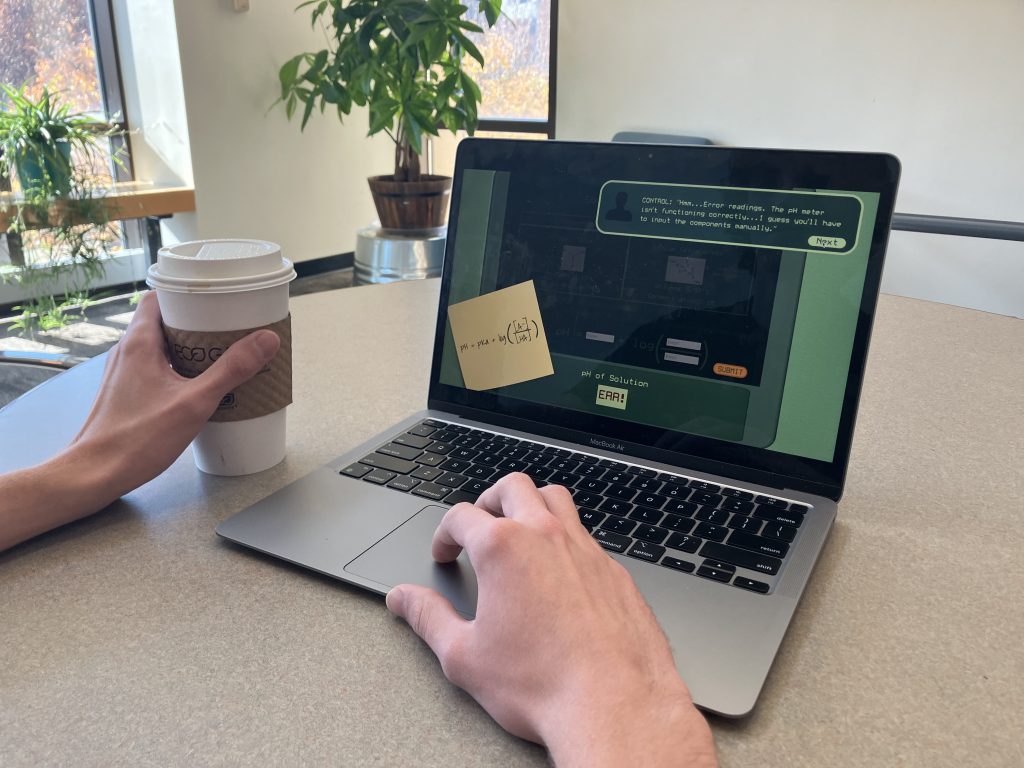
A Provost Student Success Grant has paved the way for a partnership between CAFNR’s Division of Biochemistry and on-campus game studio, Adroit Studios, to develop learning and study aids for biochemistry students. The collaboration was spearheaded by Steven VanDoren, professor of biochemistry; Director of Adroit Studios Joe Griffin; and game designer Erin Weaver.
VanDoren initiated the collaboration and was excited to introduce this new form of learning to his students.
“It gave us an opportunity to develop a cool new kind of interactive learning that hasn’t been around, and to do it at a higher level than what has happened already,” VanDoren said.
Adroit Studios is part of the School of Information Science and Learning Technology in Mizzou’s College of Education and Human Development.
As the project’s main coordinator, Griffin also was grateful for the new path the grant opened.
“Things like this were really unexpected, you know – the funding source and really awesome opportunities to just kind of do something a little more creative, a little more innovative; try something that you might not usually get to try,” Griffin said.
The study aids were created to help students grasp a multitude of biochemistry topics, which have proven exceptionally difficult in past years. The initiative first began when VanDoren took notice of certain topics that were consistently challenging for students in his biochemistry for non-majors class, BIOCHM 2110.
When the Office of the Provost presented him with the opportunity to develop the aids,, Adroit Studios was recommended as a possible collaborator. VanDoren, Griffin and Weaver got straight to work.
The trio spent the summer brainstorming topics and design aspects, trying to put together games that were easy to navigate while still being as educational as possible.
Weaver said the early stages of the project were spent “really identifying what curricular goals they had and what needs there were… We worked together to really narrow that down quite a bit.”
Adroit Studios enlisted the help of several contract artists and summer interns on the development side, and multiple biochemistry students volunteered to be game testers for the first prototypes.
“I initially had some students volunteer to test it in April in (BIOCHM) 3630. It was like the absolute first workable or playable version, and the instructions were not quite enough,” VanDoren said. “We got some initial feedback. We learned they had trouble figuring out how to work it, but there were a lot of positive comments.”
Their efforts culminated into multiple games by the beginning of the fall 2025 semester, allowing VanDoren to offer them as study aids and even use for extra credit assignments in his class.
One game which has been particularly successful is the pH Elevator game.
“The pH elevator is especially popular,” VanDoren said. “That’s been a wild success.”
The game applies a visual and interactive elevator model of pH, which can help students understand and employ the difficult mathematics involved in the study of pH.
“They seem to think it definitely helped them learn more about pH,” said VanDoren. “It can be fun to play, and it can also help bring home concepts that are elusive and hard for people to grasp.”
A second activity designed by the trio is Emergence of the Biomolecules. The game features multiple activities where students can practice matching charges to amino acids or explore the functions and behavior of genetic code. Like pH Elevator, it has also been helpful to those that have used it.
Griffin believes that videogames as a study medium open a new world for students and their chances of success.
“There’s less of a fear of failure,” Griffin said. “Traditional learning works great for tons and tons of people, but for some students — or for some tricky subjects — I think games just offer a little alternative way that has some pros and cons with it too.”
The Provost Student Success Grant acted as an essential starting point for educational tools of this nature for Biochemistry, and all three are excited about what other opportunities for student success this development could present in the future.
“I kind of view a lot of this as like the start of the project, the inspiration, the proof of concept,” Griffin said. “And then hopefully we can keep going with it.”
This story was written by a student in AGSC_COM 2150, which gives students the opportunity to explore public relations and journalistic writing with real-world experience in CAFNR.